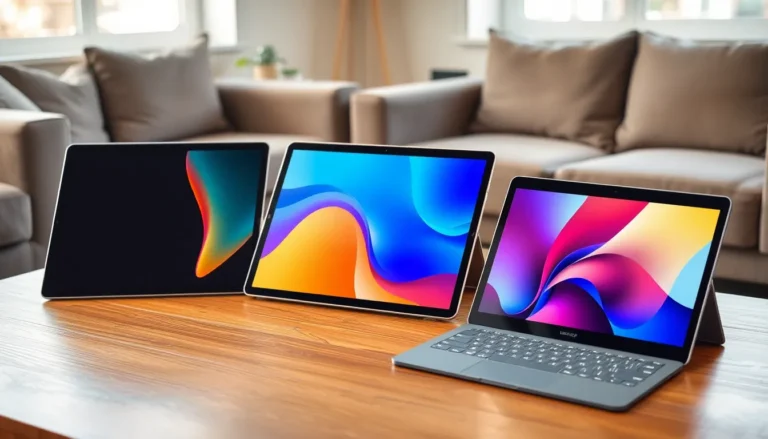In a world where energy bills seem to rise faster than a cat meme goes viral, energy-efficient laptops are the unsung heroes of tech. These sleek machines not only help users save the planet, but they also keep wallets happy. Who knew going green could feel so good?
Table of Contents
ToggleWhat Are Energy-Efficient Laptops?
Energy-efficient laptops use less power while delivering high performance. These devices play a crucial role in reducing energy consumption and lowering overall costs.
Definition and Importance
Energy-efficient laptops are designed to consume minimal electricity while maintaining performance standards. By implementing advanced technologies, manufacturers reduce energy usage without compromising functionality. Such laptops appeal to environmentally conscious consumers aiming for sustainability. Adopting energy-efficient models leads to decreased carbon footprints, fostering a greener planet. Financial savings also arise with reduced electricity bills over time. As a result, these laptops serve both ecological and economic objectives.
Key Features to Look For
Look for laptops featuring Energy Star certification, which signifies adherence to energy efficiency guidelines. Consider models with solid-state drives, known for lower power consumption compared to traditional hard drives. Focus on processors optimized for energy efficiency, such as Intel’s Core i series or AMD’s Ryzen series. Battery life is essential; longer-lasting batteries indicate better energy management. Check for adjustable screen brightness and power-saving modes to help reduce energy use further. Integrated graphics can also provide power savings over dedicated graphics cards, enhancing overall efficiency.
Advantages of Energy-Efficient Laptops

Energy-efficient laptops offer significant benefits for users and the environment. These devices combine high performance with lower energy consumption, resulting in various advantages.
Cost Savings in Energy Bills
Cost savings become apparent with energy-efficient laptops. Users experience lower monthly energy bills due to reduced power consumption. Energy-efficient processors and solid-state drives consume less electricity, which directly impacts overall utility expenses. For instance, a laptop that consumes 30% less power can save approximately $100 per year in energy costs, depending on usage. Additionally, longer battery life reduces the frequency of charging, saving users even more on energy expenses. Users that invest in these laptops often find themselves enjoying significant financial benefits over time.
Environmental Impact
Environmental impact plays a vital role in the appeal of energy-efficient laptops. These devices contribute to a decrease in greenhouse gas emissions by consuming less electricity. The reduction in energy usage leads to fewer power plants needing to operate, which can lower environmental pollution. For example, operating an energy-efficient laptop helps decrease carbon footprints. Furthermore, energy-efficient laptops promote sustainable practices by encouraging manufacturers to adopt eco-friendly technologies. Choosing these laptops supports global efforts toward sustainability while benefiting the planet’s health.
Top Energy-Efficient Laptops on the Market
Energy-efficient laptops stand as practical choices for individuals aiming to lessen their ecological impact while reducing expenses.
Laptop Model Reviews
Dell XPS 13 ranks high for its sleek design and energy-saving features. Equipped with an Intel Core processor, it combines power with efficiency, achieving Energy Star certification. Apple MacBook Air offers exceptional battery life, lasting up to 18 hours, thanks to its M1 chip, providing seamless performance while consuming less power. HP Envy x360 impresses with long battery performance and versatile functionality. Asus ZenBook 14 boasts lightweight construction and energy-efficient display technology, ideal for users on the go. Each of these models exemplifies the best features of energy efficiency, catering to diverse user needs.
Performance Comparisons
Laptops such as the Dell XPS 13, MacBook Air, and HP Envy x360 demonstrate remarkable efficiency under real-world conditions. While the XPS 13 uses about 30 watts during intensive tasks, the MacBook Air consumes approximately 20 watts, showcasing superior energy savings. In contrast, the HP Envy x360 operates at similar wattage levels but offers additional versatility for creative tasks. Performance testing reveals that Asus ZenBook 14 efficiently handles demanding applications while consuming less energy than other models on the market. Each comparison highlights the balance between power and efficiency, helping consumers find the right energy-efficient choice.
Tips for Choosing an Energy-Efficient Laptop
Choosing the right energy-efficient laptop involves understanding personal needs and budgeting effectively to maximize efficiency.
Consider Your Needs
Identify specific tasks and applications before selecting a laptop. Those needing high processing power should prioritize energy-efficient processors. Creative professionals often benefit from integrated graphics that use less power while delivering quality performance. Battery life plays a vital role in everyday usage; look for laptops offering a minimum of 10 hours on a single charge. Portability can also influence choice; lightweight models like the Asus ZenBook 14 are ideal for mobility. Evaluate extra features such as touchscreens and high-resolution displays, as these can impact overall power consumption.
Budgeting for Efficiency
Establishing a budget is crucial for selecting an energy-efficient laptop. While initial costs may vary, consider potential savings on monthly energy bills. Laptops consuming 30% less power can lead to savings of around $100 annually. Factor in the long-term benefits of upgraded components that enhance energy efficiency, such as solid-state drives. Investing in a quality laptop with higher efficiency may result in lower total ownership costs. Affordable models, like the HP Envy x360, deliver impressive energy efficiency without breaking the bank. Always weigh upfront costs against the potential savings to make an informed decision.
Energy-efficient laptops represent a smart choice for those looking to balance performance with sustainability. They not only lower energy consumption but also contribute to significant cost savings over time. By investing in these devices, users can enjoy high functionality while playing a part in reducing their carbon footprint.
As technology continues to evolve, the options for energy-efficient laptops are becoming more diverse and accessible. Whether it’s the sleek Dell XPS 13 or the versatile HP Envy x360, consumers have plenty of fantastic choices that align with eco-friendly values. Making an informed decision can lead to a more sustainable lifestyle while still meeting everyday computing needs.









